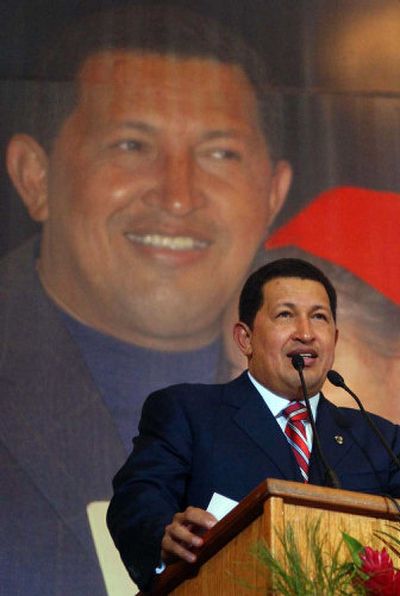U.S. trying to stop ill will led by Chavez

WASHINGTON – The Bush administration is stepping up efforts to counter the attempts of Venezuelan President Hugo Chavez to build a unified opposition to U.S. influence in a region that is drifting politically to the left.
U.S. diplomats have sought in recent years to mute their conflicts with Chavez, fearing that a war of words with the flamboyant populist could raise his stature at home and abroad. But in recent months, as Chavez has sharpened his attacks – and touched American nerves by increasing ties with Iran – American officials have become more outspoken about their intentions to isolate him.
Signaling the shift, Secretary of State Condoleezza Rice told Congress last month that the United States is actively organizing other countries to carry out an “inoculation strategy” against what it sees as meddling by Chavez.
U.S. officials view Chavez’s use of his oil-generated wealth to help opposition groups in countries such as Nicaragua, Colombia and Peru as an attempt to destabilize regimes friendly to the U.S.
“We are working with other countries to make certain that there is a united front against some of the things that Venezuela gets involved in,” said Rice, who called Venezuela a “sidekick” of Iran.
As part of the new U.S. view of Venezuela, U.S. defense and intelligence officials have revised their assessment of the security threat Venezuela poses to the region. They say they believe Venezuela will have growing military and diplomatic relationships with North Korea and Iran and point with concern to its arms buildup.The administration’s revived interest in Latin America comes at a time when Congress has been pressing the Bush administration to define its strategy amid a growing number of clashes with the Chavez government.
Last month, the United States and Venezuela engaged in a diplomatic tit-for-tat reminiscent of the Cold War when they traded espionage accusations against each others’ diplomats, then expelled them. The two countries have clashed on airspace and landing rights for civilian and military aircraft, as the United States has sought to block Venezuela’s long-shot bid to become a non-permanent member of the United Nations Security Council. Venezuela has threatened to end the oil sales that provide the United States with about 12 percent of its imports, and begun rewriting its contracts with U.S. oil companies.
The tougher U.S. approach also reflects an American interest in trying to head off any further leftist inroads in upcoming elections in the region. Thirteen governments face re-election this year in Latin America, and Chavez has made known his support for opposition candidates in several of the countries, including Mexico, which will elect its president in July.
“There is some concern that if the United States doesn’t play its cards right, there could be a major policy shift in the region that favors Venezuela’s interests over the United States,” said Daniel P. Erikson, of the Inter-American dialogue, a research organization in Washington.